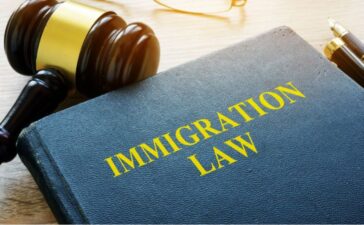A naturalization lawyer specializes in assisting individuals through the complex process of becoming a U.S. citizen. Our role involves guiding clients through the application steps, ensuring that all the necessary documentation is correctly submitted, and helping resolve any legal issues that may arise during the naturalization process. We are adept at navigating the nuances of immigration law to better serve those seeking citizenship, providing a crucial service for immigrants who may not be familiar with the intricacies of the legal system.
We work with a diverse set of clients, each with unique backgrounds and stories. Our expertise enables us to handle a variety of cases, from straightforward applications to those involving legal complications such as prior immigration violations or criminal charges. We are committed to staying up-to-date with the latest changes in immigration policy to offer the most current advice and increase the likelihood of a successful application. Learn more about Naturalization Lawyer
Our ultimate objective is to simplify the naturalization process for our clients, maximizing their chances of achieving the dream of American citizenship. We take pride in being a part of our clients’ journeys toward naturalization, providing support and legal counsel every step of the way. Our dedication to our work ensures that clients receive personalized attention and a clear understanding of the requirements and expected outcomes of their naturalization applications.
Understanding Naturalization
Naturalization is the legal process by which a non-citizen can become a citizen of a country. We must meet certain eligibility criteria to apply, understand the benefits that come with becoming a citizen, and navigate through common obstacles.
Eligibility Criteria
To become naturalized, we must meet the following requirements:
- Age: Be at least 18 years old.
- Residency: Have permanent resident status, often referred to as a green card, for specific period, usually 5 years (3 years for spouses of U.S. citizens).
- Presence: Demonstrate continuous residence and physical presence in the U.S.
- Good Moral Character: Show that we’re of good moral character, generally for 5 years prior to the application.
- Language: Demonstrate ability to read, write, and speak basic English.
- Civics Knowledge: Pass a U.S. history and government test.
- Oath of Allegiance: Be willing to take the Oath of Allegiance to the U.S.
Benefits of Naturalization
The benefits of naturalization include:
- Voting Rights: We gain the right to vote and participate fully in the democratic process.
- Passports: We can apply for a U.S. passport, which can ease travel and offer protection abroad.
- Family: We can sponsor family members for green cards.
- Federal Jobs: We become eligible for federal employment and benefits available only to U.S. citizens.
- Political Office: We can run for elected office, where citizenship is a requirement.
Common Obstacles and How to Overcome Them
Some common obstacles we may encounter:
- English Language Proficiency: We should engage in English language classes and practice regularly.
- Civics Test Preparation: We can use study materials and practice tests available from U.S. Citizenship and Immigration Services (USCIS).
- Long Residency Requirement: Maintaining continuous residence is crucial; we need to plan travels carefully and keep documentation.
- Application Errors: We should thoroughly review our application or seek legal assistance to avoid mistakes.
- Legal Issues: Address any legal issues with the assistance of a lawyer before applying.
The Naturalization Process
Navigating the naturalization process can be complex, and understanding each phase is essential for a successful application. We provide a clear roadmap and assistance in compiling the necessary documentation, preparing for the citizenship test and interview, and outlining what to expect post-application.
Step-by-Step Application Guide
Firstly, determine if you meet the eligibility criteria to apply for U.S. citizenship. If you do, complete Form N-400, the Application for Naturalization. Pay close attention to the instructions to ensure accuracy and completeness of your application. Next, submit your application with the necessary fees to the U.S. Citizenship and Immigration Services (USCIS). After submission, USCIS will send a receipt notice, followed by an appointment for biometrics (fingerprinting). Lastly, wait for the interview and test notification.
Required Documentation
When applying for naturalization, you must gather several required documents:
- Proof of Legal Permanent Resident status: This includes your Permanent Resident Card (Green Card).
- Identification: Government-issued identification such as a driver’s license or state-issued ID.
- Travel Records: Document all your travels outside the United States.
- Tax Records: Provide evidence of your tax filings for at least the last five years.
- Additional Supporting Documents: These can include proof of current marital status, and any name changes, or may vary based on individual circumstances.
Preparing for the Citizenship Test and Interview
Preparation is pivotal for the citizenship test and interview. Study the provided USCIS materials such as the “100 civics questions” for the American Government, History, and Integrated Civics sections of the test. Ensure proficiency in English, unless exempt. During the interview, be honest and provide clear answers to questions about your application and background.
Post-Application: What Happens Next?
After the interview, you’ll receive a decision from USCIS. If approved, you’ll be scheduled for a naturalization ceremony where you’ll take the Oath of Allegiance. You will then receive a Certificate of Naturalization, signifying your status as a U.S. citizen. If your application is continued, you may need to provide additional information or documents, or retake the test. In case of a denial, you have the right to request a hearing with a USCIS officer.





